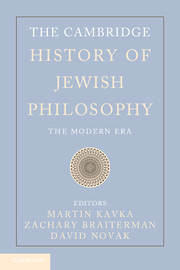Book contents
- Frontmatter
- Contents
- Contributors
- Acknowledgement
- Introduction
- I Judaism's Encounter with Modernity
- II Retrieving Tradition
- III Modern Jewish Philosophical Theology
- 10 God: Divine Transcendence
- 11 God: Divine Immanence
- 12 Creation
- 13 Revelation
- 14 Redemption
- 15 Providence: Agencies of Redemption
- IV Jewish Peoplehood
- V Issues in Modern Jewish Philosophy
- Bibliography
- Index
11 - God: Divine Immanence
from III - Modern Jewish Philosophical Theology
Published online by Cambridge University Press: 28 September 2012
- Frontmatter
- Contents
- Contributors
- Acknowledgement
- Introduction
- I Judaism's Encounter with Modernity
- II Retrieving Tradition
- III Modern Jewish Philosophical Theology
- 10 God: Divine Transcendence
- 11 God: Divine Immanence
- 12 Creation
- 13 Revelation
- 14 Redemption
- 15 Providence: Agencies of Redemption
- IV Jewish Peoplehood
- V Issues in Modern Jewish Philosophy
- Bibliography
- Index
Summary
The history of Jewish philosophy in the modern era opens a number of vistas and hits a number of snags. The concept of God is, evidently, so openly controversial that this volume includes one chapter taking each side of an unanswered question. Is God immanent or transcendent? There is good reason to suppose these concepts of God, rather than balancing each other out, represent mutually exclusive options in the coherent interpretation of Jewish life: the concept of transcendence diminishes the value of immanence, and vice versa. Whether God participates in the world or stands above and beyond it makes a difference. Yet some combination of immanence and transcendence may also present itself. But how much immanence can the world or divinity bear? For if, as Gilles Deleuze put it, “absolute immanence is in itself: it is not in something, to something; it does not depend on an object or belong to a subject,” then the question is whether anything remains left over to ground and surpass immanence, whether a difference between God and world any longer remains. While very few take an unqualified monistic view that God and world stand united, nonetheless many take a panentheistic view that God is the world and more than the world, or at least, Moses Mendelssohn, Emmanuel Levinas, and others frequently – much to our surprise – take the view of immanence before transcendence.
- Type
- Chapter
- Information
- The Cambridge History of Jewish PhilosophyThe Modern Era, pp. 337 - 370Publisher: Cambridge University PressPrint publication year: 2012

